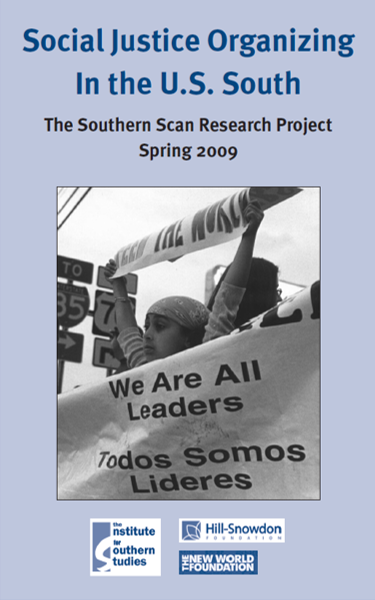Social Justice Organizing in the South

Today, there is an important national debate underway about the South. Political strategists, grassroots organizers, funders and others concerned about social justice are grappling with critical questions: What are prospects for change in the South? Is it worth investing time, energy and resources in the region? Can historic obstacles be overcome and momentum shifted to "move" a social justice agenda in the South?
To address these questions, the Institute for Southern Studies, in partnership with the Hill-Snowdon Foundation and New World Foundation, undertook an 18-month investigation into the political, economic and social landscape in the South and the state of social justice
organizing in the region.
The result is "Social Justice Organizing in the U.S. South" [pdf], one of the most in-depth looks at the state of organizing in the Southern region today. Drawing on over 80 field interviews and extensive research, the report looks at economic justice, youth, immigration and environmental justice organizing in six states: Alabama, Georgia, Louisiana, Mississippi, North Carolina and South Carolina.
"As the 2008 elections showed, there's a national debate going on about what kind of change is possible in the South and whether it's worthwhile to invest significant resources in the region," says Chris Kromm, Executive Director of the Institute and lead author of the report. "Our research finds that not only is the South is too important to ignore, but rapid shifts in the region's social and political landscape are creating exciting new opportunities for change."
Among the other highlights of the 45-page study:
* An analysis of the South's growing political clout and the importance of the 2010 Census and redistricting;
* A look at the continuing impact of Hurricane Katrina and Gulf Coast disasters on Southern organizing;
* A framework for targeting philanthropic resources in the South;
* A special post-script on key findings and lessons from the 2008 elections for developing an effective "Southern Strategy" for political change.
* State-by-state profiles featuring information on important trends, the political climate, philanthropic institutions and recent organizing campaigns.
Read the full report here.
Tags
Chris Kromm
Chris Kromm is executive director of the Institute for Southern Studies and publisher of the Institute's online magazine, Facing South.
